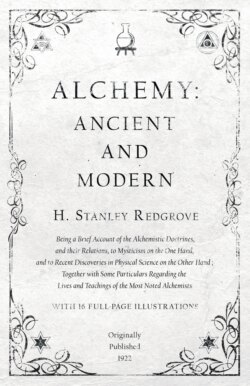Читать книгу Alchemy: Ancient and Modern - Being a Brief Account of the Alchemistic Doctrines, and their Relations, to Mysticism on the One Hand, and to Recent Discoveries in Physical Science on the Other Hand - H. Stanley Redgrove - Страница 6
На сайте Литреса книга снята с продажи.
PREFACE
ОглавлениеTHE number of books in the English language dealing with the interesting subject of Alchemy is not sufficiently great to render an apology necessary for adding thereto. Indeed, at the present time there is an actual need for a further contribution on this subject. The time is gone when it was regarded as perfectly legitimate to point to Alchemy as an instance of the aberrations of the human mind. Recent experimental research has brought about profound modifications in the scientific notions regarding the chemical elements, and, indeed, in the scientific concept of the physical universe itself; and a certain resemblance can be traced between these later views and the theories of bygone Alchemy. The spontaneous change of one “element” into another has been witnessed, and the recent work of Sir William Ramsay suggests the possibility of realising the old alchemistic dream—the transmutation of the “base” metals into gold.
The basic idea permeating all the alchemistic theories appears to have been this: All the metals (and, indeed, all forms of matter) are one in origin, and are produced by an evolutionary process. The Soul of them all is one and the same; it is only the Soul that is permanent; the body or outward form, i.e., the mode of manifestation of the Soul, is transitory, and one form may be transmuted into another. The similarity, indeed it might be said, the identity, between this view and the modern etheric theory of matter is at once apparent.
The old alchemists reached the above conclusion by a theoretical method, and attempted to demonstrate the validity of their theory by means of experiment; in which, it appears, they failed. Modern science, adopting the reverse process, for a time lost hold of the idea of the unity of the physical universe, to gain it once again by the experimental method. It was in the elaboration of this grand fundamental idea that Alchemy failed. If I were asked to contrast Alchemy with the chemical and physical science of the nineteenth century I would say that, whereas the latter abounded in a wealth of much accurate detail and much relative truth, it lacked philosophical depth and insight; whilst Alchemy, deficient in such accurate detail, was characterised by a greater degree of philosophical depth and insight; for the alchemists did grasp the fundamental truth of the Cosmos, although they distorted it and made it appear grotesque. The alchemists cast their theories in a mould entirely fantastic, even ridiculous—they drew unwarrantable analogies—and hence their views cannot be accepted in these days of modern science. But if we cannot approve of their theories in toto, we can nevertheless appreciate the fundamental ideas at the root of them. And it is primarily with the object of pointing out this similarity between these ancient ideas regarding the physical universe and the latest products of scientific thought, that this book has been written.
It is a regrettable fact that the majority of works dealing with the subject of Alchemy take a one-sided point of view. The chemists generally take a purely physical view of the subject, and instead of trying to understand its mystical language, often (I do not say always) prefer to label it nonsense and the alchemist a fool. On the other hand, the mystics, in many cases, take a purely transcendental view of the subject, forgetting the fact that the alchemists were, for the most part, concerned with operations of a physical nature. For a proper understanding of Alchemy, as I hope to make plain in the first chapter of this work, a synthesis of both points of view is essential; and, since these two aspects are so intimately and essentially connected with one another, this is necessary even when, as in the following work, one is concerned primarily with the physical, rather than the purely mystical, aspect of the subject.
Now, the author of this book may lay claim to being a humble student of both Chemistry and what may be generalised under the terms Mysticism and Transcendentalism; and he hopes that this perhaps rather unusual combination of studies has enabled him to take a broad-minded view of the theories of the alchemists, and to adopt a sympathetic attitude towards them.
With regard to the illustrations, the author must express his thanks to the authorities of the British Museum for permission to photograph engraved portraits and illustrations from old works in the British Museum Collections, and to G. H. Gabb, Esq., F.C.S., for permission to photograph engraved portraits in his possession.
The author’s heartiest thanks are also due to Frank E. Weston, Esq., B.Sc., F.C.S., and W. G. Llewellyn, Esq., for their kind help in reading the proofs, &c.
H. S. R.
THE POLYTECHNIC, LONDON, W.
October, 1910.
